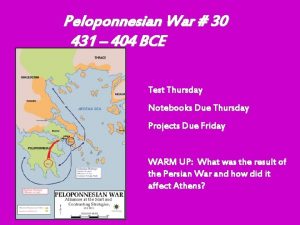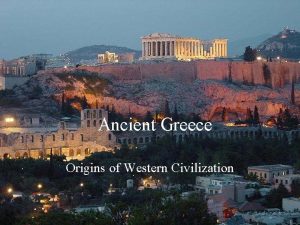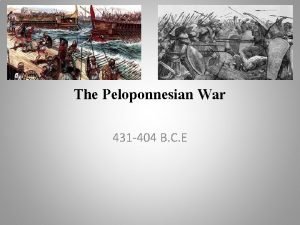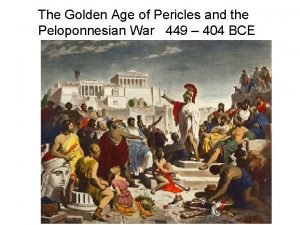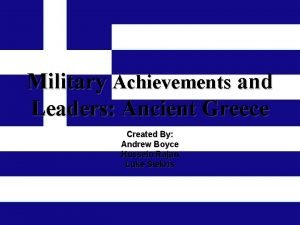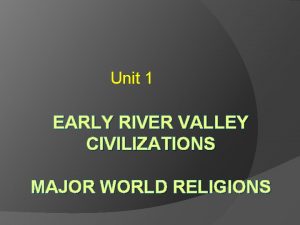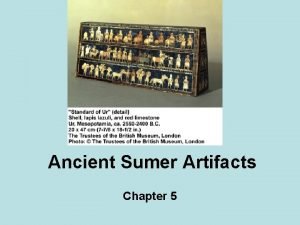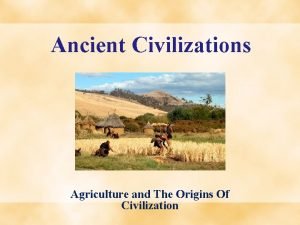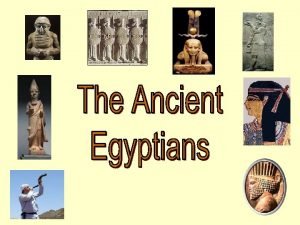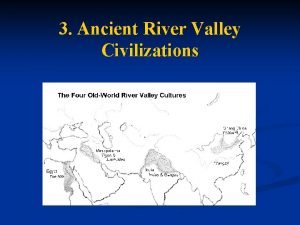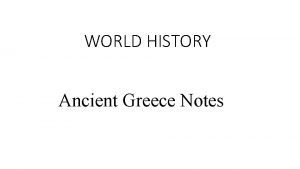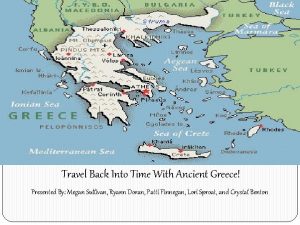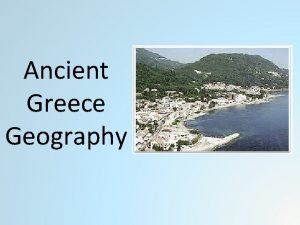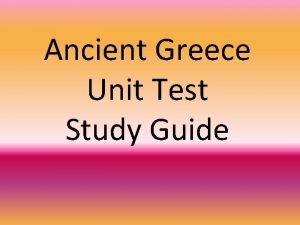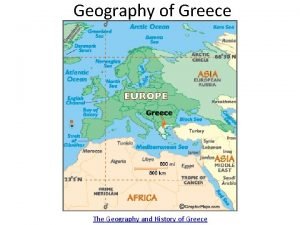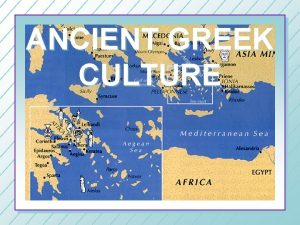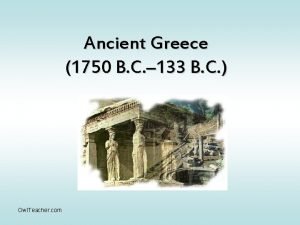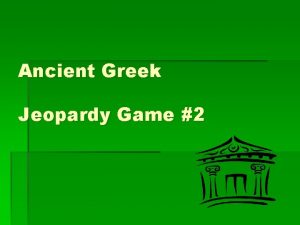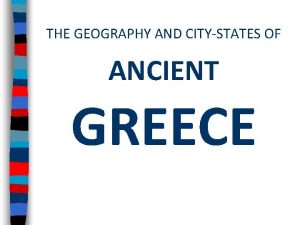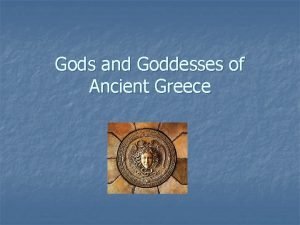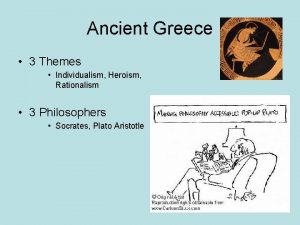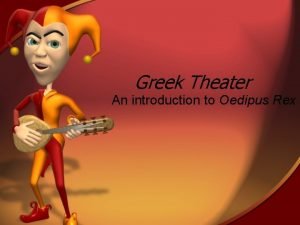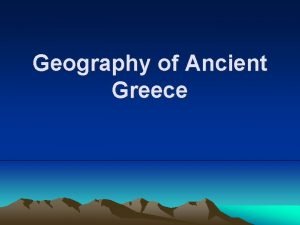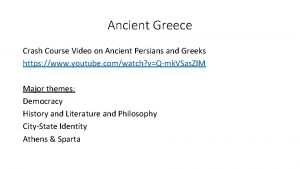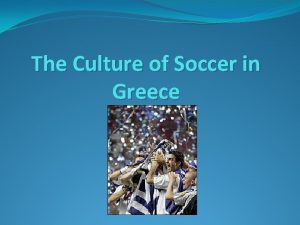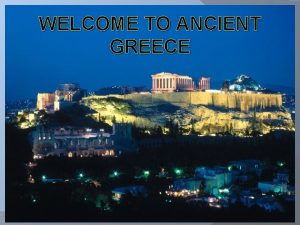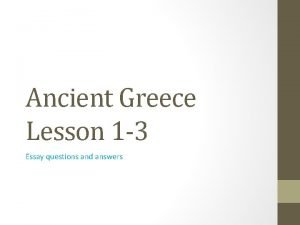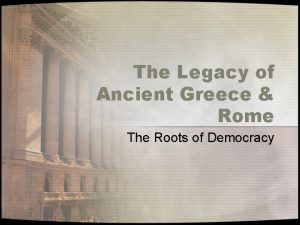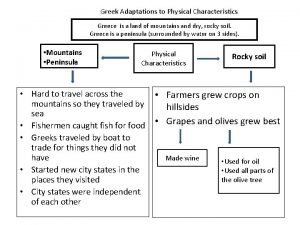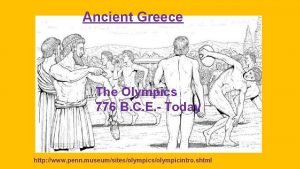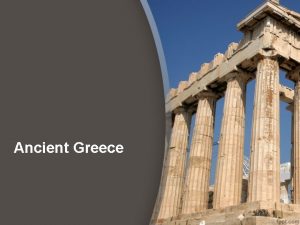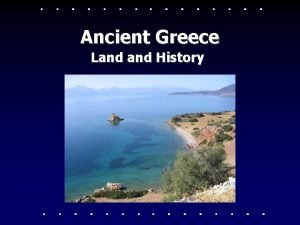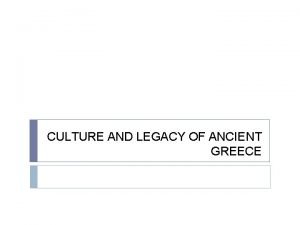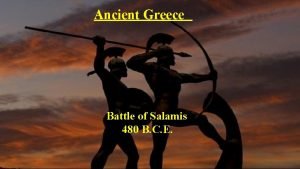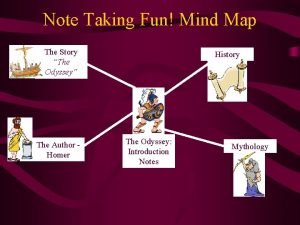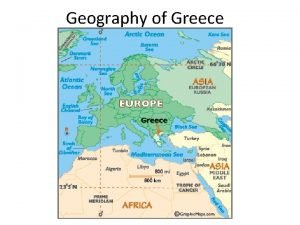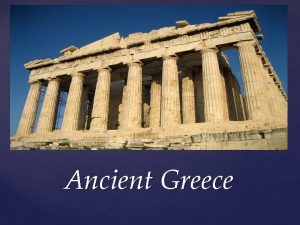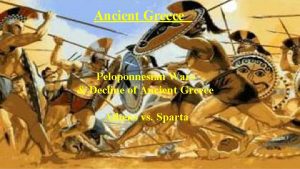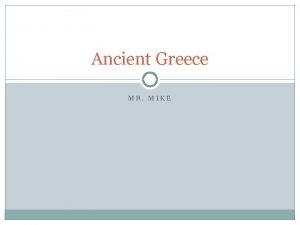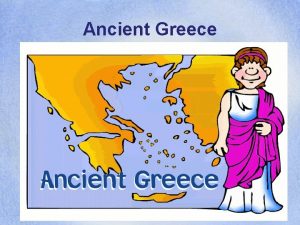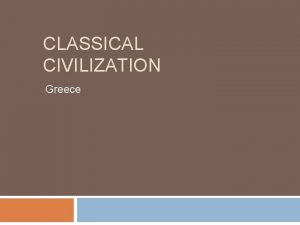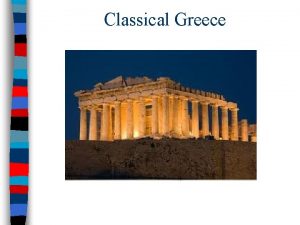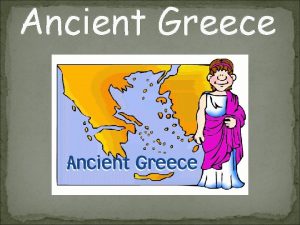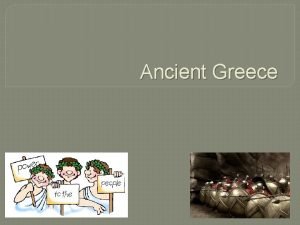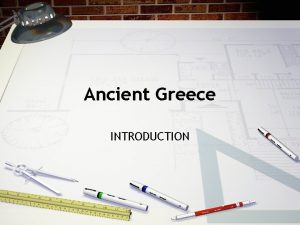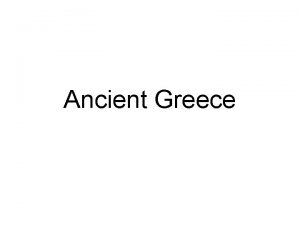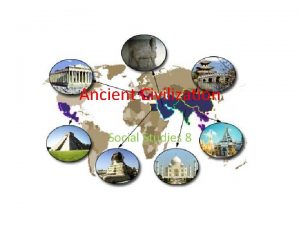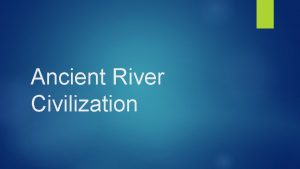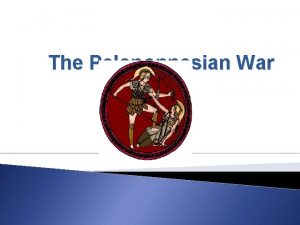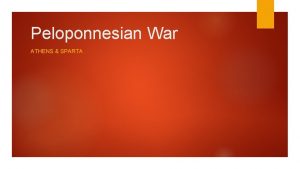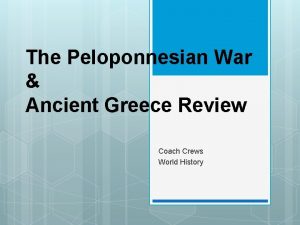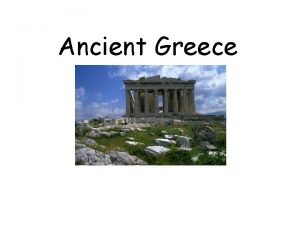Ancient Greece From MinoanMycenaean Civilization Through the Peloponnesian




















































- Slides: 52

Ancient Greece From Minoan/Mycenaean Civilization Through the Peloponnesian War and the conquests of Alexander the Great

Geography of Early Greek Civilization

I. (A) Minoan Civilization

I. (A) Minoan Civilization • Earliest society in the Aegean Sea • 2200 – 2000 BC • Located on the island of Crete • Named after its most important ruler, King Minos. • Capital city = palace complex of Knossos • Cities had very little or no fortifications = very peaceful society • Economy grew rich through trade across the sea with places as far away as Egypt.

I. (A) Minoan Civilization

I. (A) Minoan Civilization

I. (B) Mycenaean Civilization

I. (B) Mycenaean Civilization • Earliest Greek society to develop on the “Peloponnese” (mainland Greece) • Capital city = Mycenae • Large, fortified city • Many artifacts have been recovered from shaft graves • Evidence left behind shows that the Mycenaeans were led by warrior-kings who sought both power and wealth.

I. (B) Mycenaean Civilization

I. (C) Evidence of Minoa and Mycenae

I. (C) Evidence of Minoa and Mycenae • Some of the earliest possible written history of Greek cities come from the poem of Homer. • The Iliad • The Odyssey • Most scholars thought the tails of Homer were made up until…

I. (C) Evidence of Minoa and Mycenae • German businessman and thief / amateur archaeologist Heinrich Schliemann found the ruins of Troy. • This proved that Homer’s play were at least based in fact.

I. (C) Evidence of Minoa and Mycenae • Schliemann dug a huge trench through the site destroying countless artifacts. • Schliemann later claimed to have found Mycenaean King Agamemnon’s grave.

Schliemann’s Trench

Schliemann’s Trench

Exactly How Much of Homer Is True?

I. (D) Collapse of Mycenae • Reasons for the collapse of Mycenaean culture are unclear. • Many historians believe that fighting between all the early city-states caused Mycenaean culture to be weakened. • Mycenae had collapsed by around 1000 BC.

1. (E) Athens and Sparta Rise to Power

i. Athens • The polis of Athens began forming into a democracy around 621 BC • Step one = legal code that applied to ALL people (including leaders) • Step two = Solon’s Reforms • Organized citizens into four social classes • All classes of citizens could participate in the Assembly (where they voted) • Step three = Cleisthenes’ Reforms • Broke citizens into ten group based one where they lived instead of social class • Any citizen could submit a law for debate and a vote in the Assembly • These reforms resulted in Athens becoming a limited democracy, but only free-born, land-owning males could be citizens

i. Athens

i. Athens • Life in Athens centered around the Acropolis • Usually, only the males were formally educated in Athens • Because Athens was a democracy, being able to convince people your ideas were right was a very important skill • Education focused on: rhetoric, poetry, grammar, history etc. . . • Citizens were expected to: • debate and vote in the Assembly • Athletics • Military training and defense of Athens

i. Athens

i. Athens One of Athens’ greatest politicians was Pericles. What do you notice about this statue?

i. Athens = The naval power of Greece

ii. Sparta

ii. Sparta (ruins of ancient Sparta)

ii. Sparta (ruins of ancient Sparta)

ii. Sparta • Between 950 -600 BC the Spartans became the most powerful city-state on the southern Peloponnesus • The people they conquered became peasants that were tied to the land forced to work. They called these people Helots. • Politics: Sparta was ruled by two kings who were advised by a council of the citizens. • Military state: Sparta was known for the strength of their army. All male citizens had to serve until age 60. • Left home to train at age 7 and stayed at the barracks until age 30 • Soldiers in training were underfed and encouraged to steal food (to prove they were resourceful), but if they were caught – they were punished severely.

Spartan Hoplite (citizen-soldier)

Spartan Hoplite-Phalanx

ii. Sparta • Spartan men who passed training became “equals” (full citizens) • They would continue to have mandatory meals with their hoplite unit • As a result of the men being gone from the home most of the time, Spartan women had more freedom and responsibility than any other Greek women. • Women ran the home, and often managed the land.

F. Persian War • The Persian Empire under the rule of King Darius expanded into Greek territory leading to a war with Greek city-states. • The Persian Empire was the largest and strongest empire in the world at the time.

F. (i) Battle of Marathon

F. (i) Battle of Marathon • 490 BC: • 25, 000 Persian troops vs. 10, 000 Greek Hoplites • Greeks put weak troops in the center of their battle line, and used the strong sides of their army to surround and slaughter the unprepared Persian troops.

F. (i) Battle of Marathon

F. (ii) Battle of Thermopylae • 5, 000 Greeks led by 300 Spartan hoplites block the narrow pass along the coastline at Thermopylae. They face a Persian army of more than 300, 000. • They hold the pass for three days before the Persians find a way around them and attack from both sides. • This buys the Greeks time to prepare the defense of the Peloponnese.

F. (ii) Battle of Thermopylae

F. (ii) Battle of Thermopylae

F. (iii) Battle of Salamis • Athenians decided that the best way to defend their city was to save its people. They decide to evacuate and fight the Persians at sea. • The Athenian navy of 200 triremes faces a Persian fleet of more than 400 ships. • Persian King Xerxes watched as almost half of his ships were destroyed by the Athenians in the narrow straight of Salamis.

F. (iii) Battle of Salamis

F. (iii) Battle of Salamis

Peloponnesian War – Athens vs. Sparta • After the end of the Persian War, Athens became the leaders of a powerful group of city-states known as the Delian League • Sparta opposed Athen’s growth of power by forming a rival group called the Peloponnesian League. • Competition for control of Greece led to the outbreak of the Peloponnesian War • After more than 30 years of war, Athens is defeated by a combination of Spartan military power and a plague.

Peloponnesian War – Athens vs. Sparta

Peloponnesian War – Athens vs. Sparta

E. (i) - Socrates • Taught that truth could only be reached by assuming you didn’t know very much. • “The unexamined life is not worth living” • Forced to drink poison as an execution for “corrupting the youth of Athens. ”

E. (ii) - Plato • Taught by Socrates • Started a school called “The Academy” • Wrote “The Republic” • About a perfect utopian society

Teacher and Student

E. (iii) - Aristotle • Work focused on the use of logic in argument and investigation • Questioned the nature of human knowledge and the world we live in. • Alexander the Great’s teacher

III. (a) The Conquests of Alexander • King of Macedonia • Continued the conquest of his father King Phillip II • Used powerful army to conquer territory from Greece to Egypt to India • His success as a military commander earned him the name “Alexander the Great”

III. (a) The Conquests of Alexander

III. (b) The Spread of Hellenistic Culture • Alexander the Great used his military conquests to spread a new, blended culture that was labeled “Hellenistic” • Hellenistic culture was a mix of Greek culture with the cultures of the areas conquered by the Macedonians • Egyptian, Indian, and Persian influences mixed with the Greek to form a new and unique culture. • Even had its own mixed language = Koine

III. (b) The Spread of Hellenistic Culture
 Persian wars end
Persian wars end Peloponnesian war results
Peloponnesian war results Thucydides the melian dialogue
Thucydides the melian dialogue The alliance of greek city-states was called the _____.
The alliance of greek city-states was called the _____. 404 bce
404 bce Peloponnesian war
Peloponnesian war Great peloponnesian war
Great peloponnesian war Peloponnesian war
Peloponnesian war Ancient egypt civilization
Ancient egypt civilization Was ancient sumer a civilization chapter 5
Was ancient sumer a civilization chapter 5 Ancient civilization agriculture
Ancient civilization agriculture Ancient egypt civilization geography
Ancient egypt civilization geography 4 river valley civilizations
4 river valley civilizations Mycenae ancient greece map
Mycenae ancient greece map Where was ancient greece located
Where was ancient greece located Greece geographical features
Greece geographical features Ancient greece unit test
Ancient greece unit test Aegean peninsula
Aegean peninsula Ancient greece egypt
Ancient greece egypt Geography of ancient greece
Geography of ancient greece Humanism in ancient greece
Humanism in ancient greece Ancient greece 1750 b.c-133 b.c answers
Ancient greece 1750 b.c-133 b.c answers Ancient greece jeopardy
Ancient greece jeopardy Classical greek instruments
Classical greek instruments Romans invade greece
Romans invade greece Describe the geography of ancient greece
Describe the geography of ancient greece Ancient greece jeopardy
Ancient greece jeopardy Saturn kronos
Saturn kronos Aristocrats in ancient greece
Aristocrats in ancient greece Ancient greek actors wore
Ancient greek actors wore Individualism in ancient greece
Individualism in ancient greece Map of ancient greece balkan peninsula
Map of ancient greece balkan peninsula Map ancient greece
Map ancient greece Rise of greek civilization
Rise of greek civilization Where is ancient greece located today
Where is ancient greece located today Ancient greece crash course
Ancient greece crash course Hoologanism
Hoologanism Ancient greece map quiz
Ancient greece map quiz Ancient greece essay topics
Ancient greece essay topics Values of greek drama
Values of greek drama Sparta physical education
Sparta physical education The legacy of ancient greece and rome
The legacy of ancient greece and rome Physical characteristics of greece
Physical characteristics of greece Ancient greece olympics opening ceremony
Ancient greece olympics opening ceremony Olympics greece
Olympics greece Who wrote the republic in ancient greece
Who wrote the republic in ancient greece Balkan peninsula ancient greece map
Balkan peninsula ancient greece map Greek mythology webquest
Greek mythology webquest Ancient greece land
Ancient greece land Culture and legacy of ancient greece stations
Culture and legacy of ancient greece stations Salamis map ancient greece
Salamis map ancient greece The odyssey mind map
The odyssey mind map Ancient greece balkan peninsula
Ancient greece balkan peninsula

